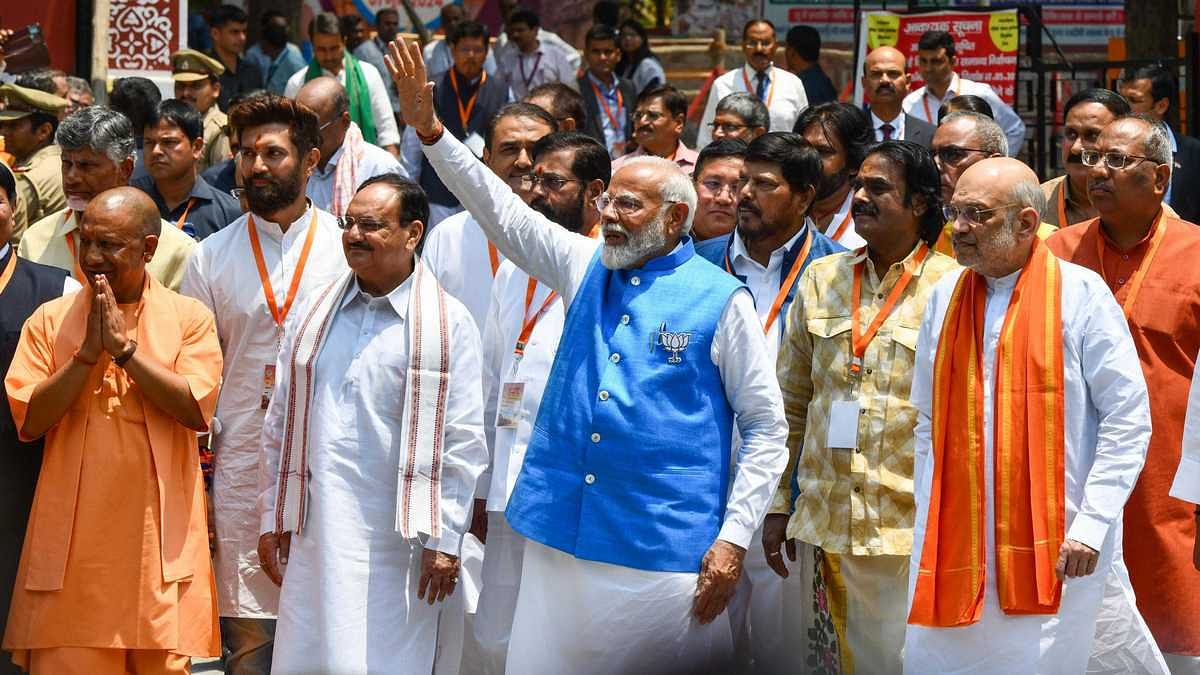New Delhi: The BJP leadership is facing backlash from within the party for dropping almost half of its sitting MPs from the running for the Lok Sabha elections—132 out of 303. This disgruntlement has even led to some leaders switching sides, with incumbents like Rahul Kaswan from Rajasthan’s Churu and Ajay Nishad from Bihar’s Muzaffarpur now fighting under the Congress banner.
Yet, despite dissent on about 100 seats over candidate choice, BJP election strategists seem to have calculated that the payoff for dropping incumbents is worth the cost.
ThePrint’s analysis of data from the 2019 and 2014 Lok Sabha elections shows that in 9 out of 10 constituencies where incumbents were dropped, the BJP still won. The party also performed well in seats where incumbents were not dropped. Overall, the data seems to vindicate the high command’s decision to replace MPs based on anti-incumbency sentiment or the “winnability factor”.
In 2014, the strike rate for candidates replacing incumbents was 92.50 percent, compared to 87.18 percent for those contesting again.
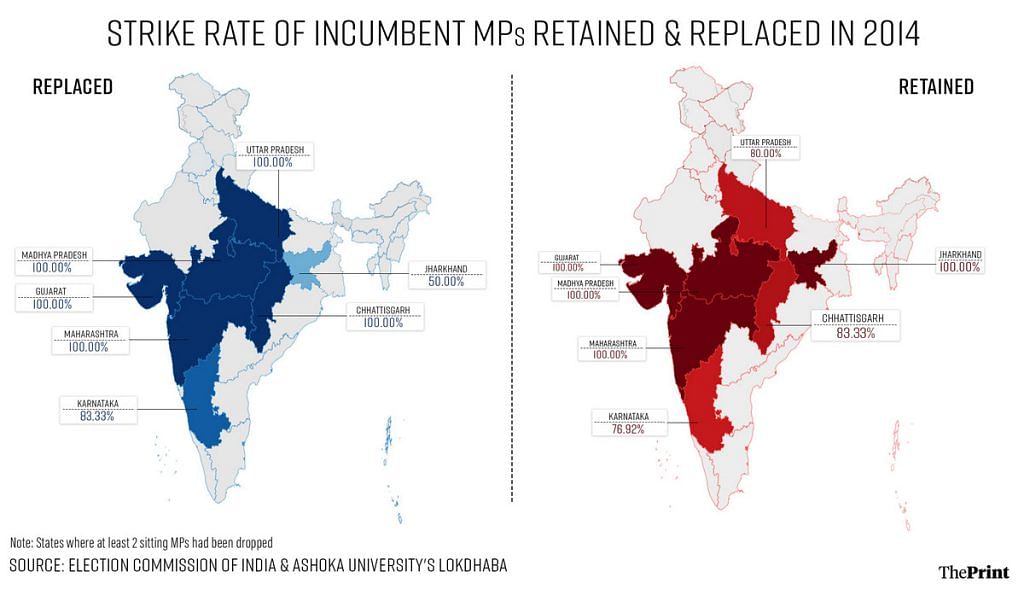
In 2019, this gap narrowed to less than 1 percent. Replaced candidates had a 91.26 strike rate (94 out of 103), while repeated incumbents had 90.80 percent (148 out of 163).
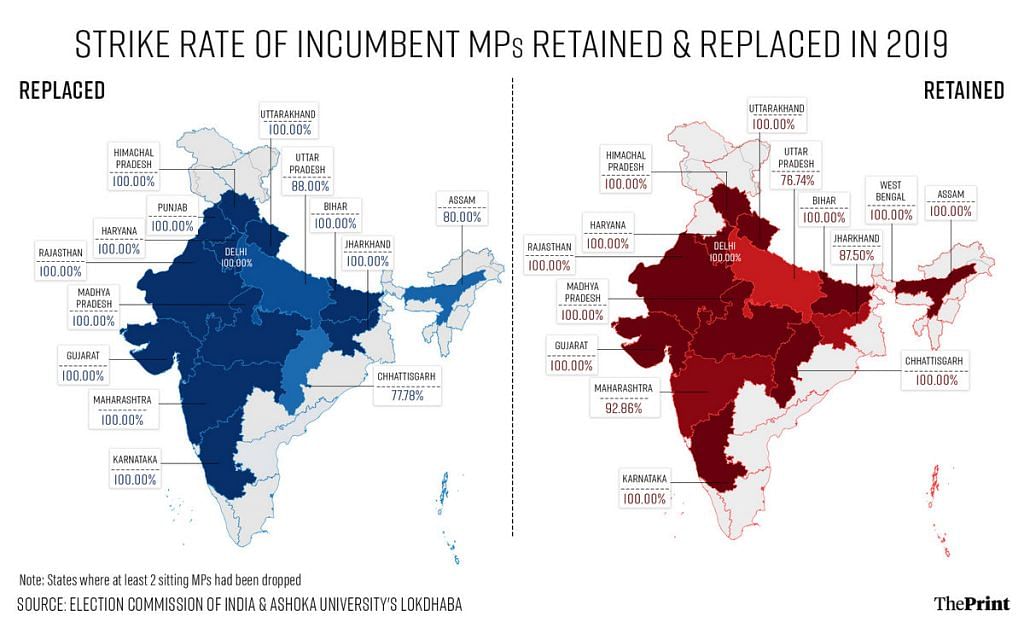
However, the results vary by state/UT, and no clear pattern emerges.
Out of the 27 states and Union Territories (UTs) where the BJP had an MP in 2019, the party retained all its seats in 17 of them.
However, the BJP lost its sole MPs in Tamil Nadu and Dadra and Nagar Haveli, where the candidates were repeated. In contrast, it also lost both its seats in Andhra Pradesh and one in the Andaman & Nicobar Islands, all of which had non-incumbent candidates.
Similarly, in Jharkhand and Maharashtra, the BJP’s only losses were from seats where candidates were repeated. Conversely, in Chhattisgarh and Assam, the party’s combined three losses were from seats where incumbents were replaced.
Also Read: ‘Heart has soured’—why UP’s RSS workers are lying low in BJP campaign
Big hitters also axed in 2024
The strategy behind dropping sitting MPs is “winnability”, according to party spokesperson RP Singh.
“Decisions are taken based on surveys, feedback of party cadres among other things while deciding a candidate of the party,” he told ThePrint.
However, political analyst Sandeep Shastri argued that dropping previous winners has even more to do with fending off broader anti-incumbency.
“Once you are in power for ten years, how do you deflect attention away from the performance of the government where there could be some visible signs of anti-incumbency? One way to do it is to change the candidates and project an impression of bringing new representatives, hoping this will offset any incumbency factor,” Shastri said.
This election, the BJP has dropped a higher percentage of incumbents—43.2 percent— than in either 2014 or 2008.
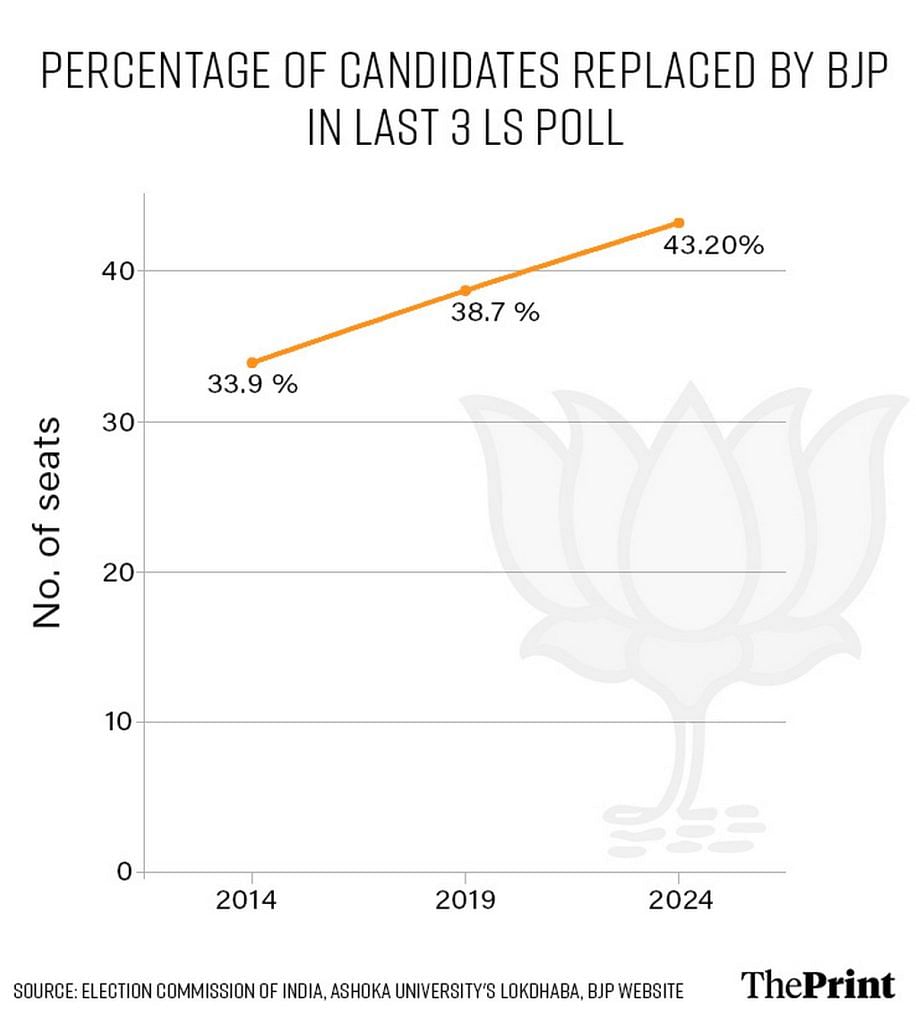
Out of the BJP’s total of 303 seats, three have gone to allies this time—Kolar in Karnataka (JD-S), Sheohar in Bihar (JDU), and Baghpat in UP (RLD).
Of the remaining 300, some surprising patterns emerge from the BJP’s choice of candidates.
For instance, 53 MPs (40.2 percent) who have been dropped won their seats in 2019 with a margin of at least 3 lakh votes. This includes 8 MPs whose victory margin was between 5 and 6 lakh votes.
Among them, Sanjay Bhatia of Karnal, who won by 6.56 lakh votes, has been replaced by former Haryana CM Manohar Lal Khattar. Bhilwara’s Subhash Chandra Baheria, who won by 6.1 lakh votes, has been replaced with Damodar Agarwal. Hans Raj Hans, the North West Delhi MP, who won by 5.5 lakh votes, has been moved to contest in Faridkot, Punjab.
Other high-margin winners who have been dropped include Hazaribagh MP Jayant Sinha and Surat’s Darshana Vikram Jardosh.
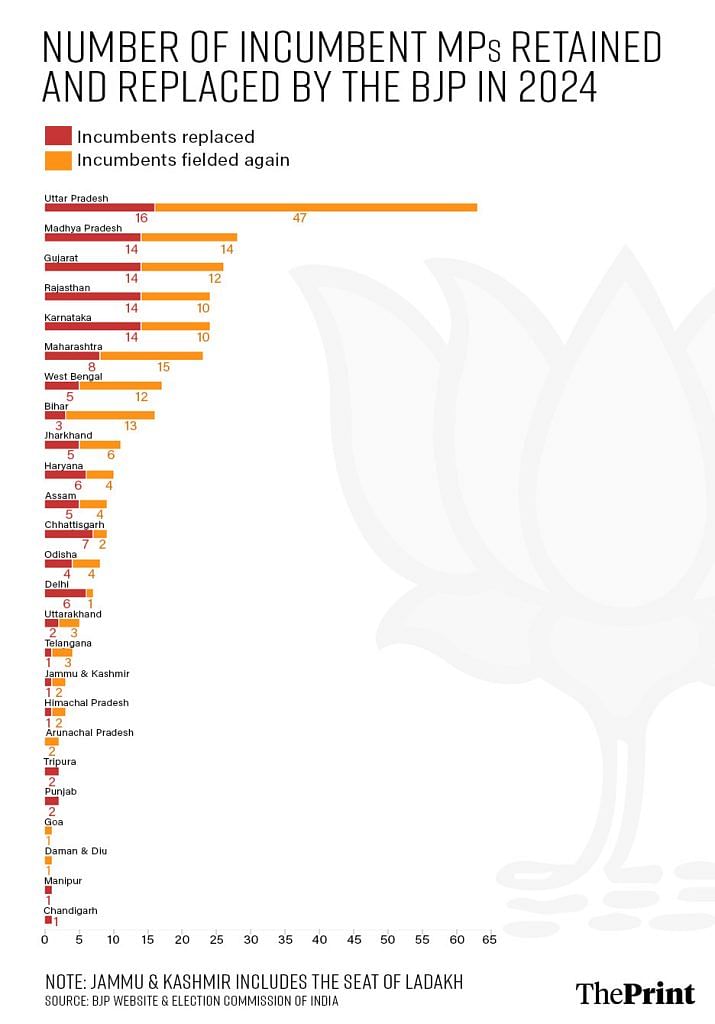
Shake-ups in states
In Uttar Pradesh, where the BJP draws its maximum strength, the party has dropped every fourth MP this time. Sixteen MPs (or 25.4 percent) have been dropped out of 63 incumbents. This decision may be influenced by the 2019 Lok Sabha polls, where the strike rate for new candidates was 88 percent, compared to 76 percent for repeated incumbents.
In other states with at least seven BJP MPs, the highest percentage of dropped MPs is in Delhi (85.7 percent). Except for Manoj Tiwari from North East Delhi, all the remaining six sitting MPs, including Union minister of state Meenakshi Lekhi and former Union minister Dr Harsh Vardhan, have been dropped. Delhi is followed by Chhattisgarh (7 out of 9 or 77.7 percent) and Haryana (6 out of 10 or 60 percent).
Among other major states, the BJP has replaced over 50 percent of the sitting MPs in Karnataka (14 out of 24), Rajasthan (14 out of 24), and Gujarat (14 out of 26), and exactly half in Madhya Pradesh (14 out of 28). In 2019, the party swept the latter three states and won 25 out of 28 seats in Karnataka. In Assam, the BJP has replaced five out of nine MPs.
Political analyst Shastri noted that the strategy of dropping incumbents has been used in states like Madhya Pradesh and Gujarat in the past, and the BJP may have found it effective at the time.
However, he added that this approach can also present challenges, particularly because no guarantee changing candidates will divert attention from the government’s overall performance.
“When someone who has been an MP for a term or more, they have developed their own base within the process. Denying that to them by changing the candidate creates a sense of deprivation,” he said.
Shastri argued that while someone from “frontal organisations” like the RSS might be more accepting of this due to their commitment to core ideology, others may not.
“You increasingly have people now within the BJP who do not come through the frontal organisations. And for these people it is a genuine loss of status and power,” he said.
While BJP spokesperson RP Singh insisted that there is no rebellion within the ranks, there seems to be evidence to the contrary. On Monday, for example, the BJP issued a show-cause notice to former Union minister and two-time Hazaribagh MP Jayant Sinha for “maligning” the party’s image for skipping campaigning after Manish Jaiswal was declared the candidate.
(Edited by Asavari Singh)
Also Read: ‘Was told I got votes due to upar wale log’ — Bihar MP Ajay Nishad, who quit BJP after ticket denial

